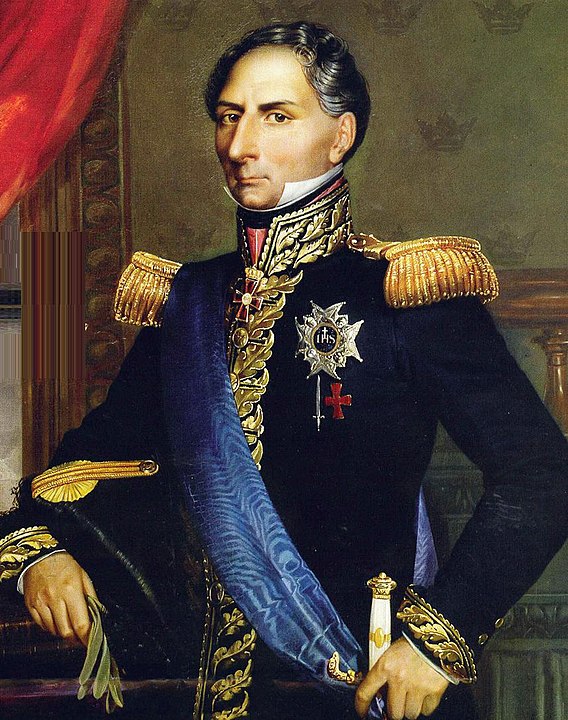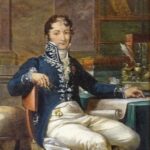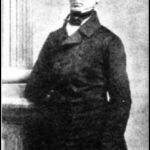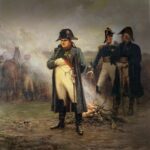According to legend it was Bernadotte who suggested Beethoven to compose a symphony for Napoleon, the one which became his Third Symphony, the Eroica. Is the myth true? Who was this remarkable person?
Who was Marshal Bernadotte?
Jean Baptiste Jules Bernadotte was born on January 26, 1763, in Pau, France. His father was the local prosecutor and wished his son to be a lawyer, but he embraced a career in the army instead. His raise in ranks and his life is nothing less than a miracle.
Soon, he became a brigadier general, briefly the Minister of War and after the proclamation of the French Empire, Napoleon named him a Marshal. After his significant role in the victory at Austerlitz he was made Prince of Pontecorvo. Through marriage he also became brother-in-law to Joseph Bonaparte and as such, part of the imperial family.
In 1810 he was elected as Crown Prince to the childless King Charles XIII of Sweden. He ascended to the throne in 1818 and rained as King of Sweden and Norway until his death in 1844. He is the ancestor of several monarchs today, not only in Sweden, but also in Norway, Luxembourg, Belgium and Denmark.
Bernadotte in Vienna
General Jean Baptiste Jules Bernadotte arrived in Vienna as the new French minister in February 1798. He was young, handsome and energetic, devoted to the Revolution. Initially he was well received by the city, even the court and the Emperor. In his approach he did not recognize any titles, other than that of citizen.
His fame and fortunes lasted only for a few weeks. In a deliberate provocation (probably not the first and only) he ordered the French tricolor flag to be flown over his hotel. Viennese gathered, throwing rocks and burning the flag. He threatened the mob, but finally had to be saved by the local cavalry. Soon, Napoleon ordered him back to Paris.
Did Beethoven and Bernadotte meet in Vienna?
Bernadotte is believed to have met Beethoven during his time in Vienna. According to this version of recollection it was Prince Lichnowsky who introduced him, and also the famous French violinist and composer Rodolphe Kreutzer, to Beethoven.
Bernadotte shared stories of great battles, meanwhile Kreutzer introduced French revolutionary music to Beethoven. This had great effect on the composer and many ideas stuck with him. What was this new revolutionary French music like? It incorporated elements of folk music, military and funeral marches, and operatic elements. The audience was broader and often played in open public spaces. It became secular that marks humanity’s progress in history, not religious events.
Was the symphony to Napoleon suggested by Bernadotte?
It is a fact that Beethoven’s Third Symphony at first was named Bonaparte, a clear dedication to Napoleon. The question is, how and why did Beethoven name his masterpiece like this?
According to Schindler, his factotum for a period, the suggestion came from then ambassador to Vienna, Jean-Baptiste Bernadotte.
In his version Beethoven became a frequent visitor at the French embassy, where he openly “…had already expressed great admiration for the First Consul of the Republic.” The composer did not admire his achievements on the battlegrounds, but rather that “the First Consul had produced political order out of the chaos of a bloody revolution.” Bernadotte then suggested Beethoven, that he should compose a work “to honor the greatest hero of the age in a musical composition… about the master, having battled with his political scruples”.
Unfortunately, there is no more evidence on the origins of the idea for a hero symphony, but of Schindler’s. This man is known to forge history and doctor papers and as such not to be trusted as sole source of information. Often, though, he was right and correct, and this story is somehow a believable background for the Eroica symphony.
Later, when the news arrived to Vienna about Napoleon declaring himself Emperor, Beethoven was furious. Ries remembers the events,
“In writing this symphony Beethoven had been thinking of Buonaparte, but Buonaparte while he was First Consul. At that time Beethoven had the highest esteem for him and compared him to the greatest consuls of ancient Rome. Not only I, but many of Beethoven’s closer friends, saw this symphony on his table, beautifully copied in manuscript, with the word “Buonaparte” inscribed at the very top of the title-page and “Luigi van Beethoven” at the very bottom. …I was the first to tell him the news that Buonaparte had declared himself Emperor, whereupon he broke into a rage and exclaimed, “So he is no more than a common mortal! Now, too, he will tread under foot all the rights of man, indulge only his ambition; now he will think himself superior to all men, become a tyrant!” Beethoven went to the table, seized the top of the title-page, tore it in half and threw it on the floor. The page had to be re-copied and it was only now that the symphony received the title “Sinfonia eroica.”









